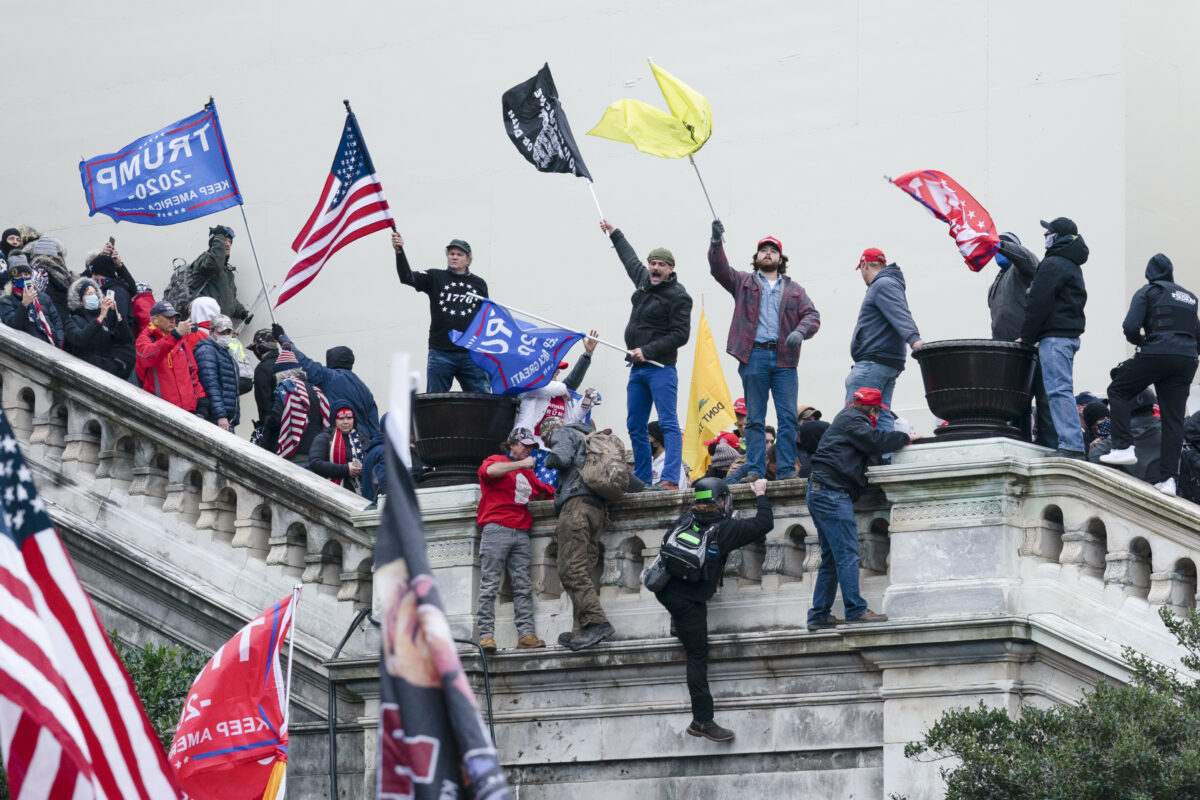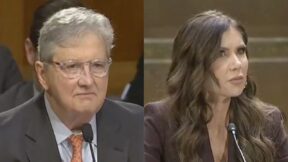DOJ Prosecutors in Tennessee Refuse to Drop Jan. 6 Rioter’s Conviction for Conspiring to Murder FBI Agents and Police

AP Photo/Jose Luis Magana, File
President Donald Trump may have issued pardons to the Capitol rioters, but that doesn’t let them evade consequences for other crimes, as Department of Justice prosecutors argued in a motion filed in a federal court in Tennessee opposing the efforts of a defendant to reverse his indictment for a scheme to murder FBI agents and other law enforcement officers.
Edward Kelley, a resident of Maryville, Tennessee, was arrested in May 2022. He was charged with “assaulting, resisting, or impeding officers, civil disorder, destruction of government property, and related offenses” during the Jan. 6, 2021 attack on the U.S. Capitol, according to a DOJ press release, which provided more detail about the specific allegations against him:
According to court documents, on Jan. 6, Kelley was among a crowd of rioters illegally gathered at the Capitol Building. He was wearing a gas mask and green tactical helmet and had a backpack secured across his chest. Kelley moved to the scaffolding over the stairs of the West Front of the Capitol Building, where he and two other men got into an altercation with a Capitol Police officer. Kelley also pushed and pulled on a metal barricade as he made his way to the outside of the Senate Wing Door. He then used a piece of wood to breach the window adjacent to the Senate Wing Door. He was the fourth rioter to enter the building through the window. After entering through the breached window, Kelley moved to the still closed Senate Wing Door and kicked it open, which allowed other rioters to enter.
While Kelley was still facing those charges, he was arrested in December 2022 along with another man, Knoxville resident Austin Carter, and charged with “conspiracy, retaliating against a federal official, interstate communication of a threat, and solicitation to commit a crime of violence.” The DOJ press release announcing that arrest described how the two men had allegedly compiled a “kill list” of the FBI agents and local and state law enforcement officers who had been involved in investigating Kelley’s actions during the Capitol riot, plotted to how to surveil and kill them, including an attack on the FBI’s field office in Knoxville.
Kelley was convicted in the Jan. 6 case on November 8, 2024 in a federal court in Washington, D.C., being found guilty in a bench trial of three felonies and eight misdemeanors. His scheduling was set for April 7, 2025, but became moot after Trump’s executive order on inauguration day that “grant[ed] a full, complete and unconditional pardon to all other individuals convicted of offenses related to events that occurred at or near the United States Capitol on January 6, 2021.” Pursuant to that pardon, the U.S. Attorney’s Office in D.C. filed a motion to dismiss many pending cases that included Kelley’s.
On November 20, 2024, Kelley was convicted for the conspiracy to kill the FBI agents and other police in a federal court in Tennessee. After a three-day trial in which his co-defendant Carter had pled guilty and testified against him, a jury found Kelley guilty of conspiracy to murder federal employees, solicitation to commit a crime of violence, and influencing a federal official by threat. His sentencing was scheduled for May 7, 2025 and he is facing up to life in prison.
Kelley’s defense attorneys cited Trump’s pardon in a motion seeking to vacate the second conviction, and Casey Arrowood and Kyle Wilson, the Assistant U.S. Attorneys for the Eastern District of Tennessee who prosecuted the case, filed a scathing response.
In the prosecutors’ motion, Arrowood and Wilson argued that the “plain language ” of Trump’s pardon would not cover this case and there was no other legal authority that would support granting a motion to dismiss.
“As both parties made explicitly clear to the Court and jury throughout litigation in this Court, this case is not about January 6, 2021,” the prosecutors wrote, and was not about Kelley’s “conduct related to events at or near the United States Capitol” on that day. Instead, they continued, it was about Kelley’s “entirely independent criminal conduct in Tennessee, in late 2022, more than 500 miles away from the Capitol,” conduct that “was unrelated in both time and place to the events that occurred at or near the United States Capitol on January 6, 2021.”
The motion went on to cite multiple cases where courts had reached the same conclusion that Trump’s pardon did not include criminal charges for “conduct separate in time or place from the events at or near the United States Capitol on January 6, 2021.”
Trump’s pardon has already been “administered and effected” by the dismissal of Kelley’s D.C. case, and that pardon “does not provide any relief as to the defendant’s crimes in Tennessee,” the prosecutors concluded. “This case should not be dismissed, and the defendant should be sentenced as scheduled on May 7, 2025.”
Reached for comment after he had read the motion, former Palm Beach County State Attorney Dave Aronberg told Mediaite that he agreed with the DOJ, calling the legal issue “a no brainer, as the pardons did not give a get-out-of-jail-free card to anti-government extremists who tried to murder law enforcement two years after January 6th, and many miles away from Washington, D.C.”
Aronberg, a Democrat who was appointed by then-Florida Attorney General Pam Bondi (R) to serve as the state’s Special Prosecutor for Prescription Drug Trafficking and then served in the Florida Senate before being elected State Attorney in 2012, added a criticism about the effect of Trump’s pardons of the Jan. 6 rioters.
“The fact that President Trump’s pardons gave this violent individual reason to hope for a dismissal is yet another example of how egregiously anti-law enforcement these pardons were,” said Aronberg.
New: The Mediaite One-Sheet "Newsletter of Newsletters"
Your daily summary and analysis of what the many, many media newsletters are saying and reporting. Subscribe now!






Comments
↓ Scroll down for comments ↓